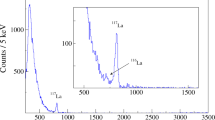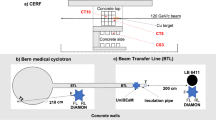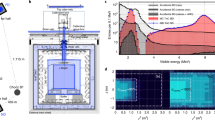Abstract
LEA'S observations and Fermi's pioneer work has shown that many elements may capture a neutron, and emit gamma rays in the process. This phenomenon has been further investigated especially by Rasetti1, and more recently by Kikuchi2 and Fleischmann3, who used polonium-beryllium, deuteron-deuterium and radon-beryllium sources respectively.
This is a preview of subscription content, access via your institution
Access options
Subscribe to this journal
Receive 51 print issues and online access
$199.00 per year
only $3.90 per issue
Buy this article
- Purchase on Springer Link
- Instant access to full article PDF
Prices may be subject to local taxes which are calculated during checkout
Similar content being viewed by others
References
Rasetti, Z. Phys., 97, C4 (1935).
Kikuchi, Husimi and Aoki, Proc. Phys.-Math. Soc. Japan, 18, 188 (1936).
Fleischmann, Z. Phys., 100, 307 (1936).
Dunning, Pegram, Fink and Mitchell, Phys. Rev., 48, 265 (1935).
Hevesy and Levi, NATURE, 137, 185 (1936).
Cf. Feather, ” Nuclear Physics”, p. 183 (1936).
Author information
Authors and Affiliations
Rights and permissions
About this article
Cite this article
GRIFFITHS, J., SZILARD, L. Gamma Rays excited by Capture of Neutrons. Nature 139, 323–324 (1937). https://doi.org/10.1038/139323b0
Issue Date:
DOI: https://doi.org/10.1038/139323b0
Comments
By submitting a comment you agree to abide by our Terms and Community Guidelines. If you find something abusive or that does not comply with our terms or guidelines please flag it as inappropriate.



